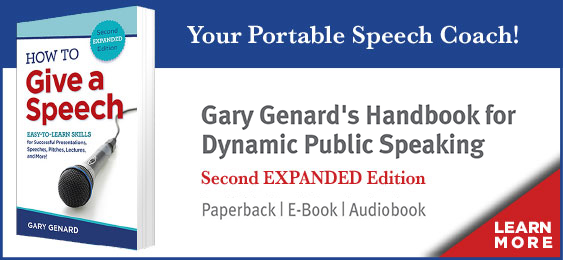Jack in the Jack and the Beanstalk fairy tale had those five magical beans. But you can go Jack one better with six magic words that can help make you a giant in terms of public speaking success.
It’s a formula that every actor knows, and one that's an essential component of a robust public speaking toolbox as well.
(What about words you should avoid? Learn the expressions that may get in the way of your success. Download my free cheat sheet, "25 Words or Phrases to Avoid in Speeches and Presentations.")
Acting Techniques and Public Speaking
When you speak in public, you have the same problem an actor has: How do you translate mere words into something meaningful for an audience? Whether it’s dealing with a script or presentation notes, every performer must make what he or she says come alive. For actors and public speakers alike, it’s the human connection, and the urgency of the message they need to convey for audiences to be engaged and activated.
In other words, leadership on every kind of stage requires focus and presence to create true influence. From the positive thinking of your preparation, to mindfulness in your performance, you have to give more than the mere content of your remarks. Your job is always to deliveryourself to your audience. Only you can explain and place into context what you’re saying, far beyond the ability of the bare information you’re giving listeners.
Those scripts or speaking notes, after all, are only squiggles on a page or notecard. The rest of what’s there is what really matters for your audience.
So, take to heart the six magic words that every actor knows:
Play what’s not in the script.
Untrained actors know enough to memorize and recite what's on the page. Good actors give their audiences the fullness of the human being—what he or she is going through—apart from the words that come out of their mouth. Play that in your own speeches and presentations, and you’ll give audiences the full benefit of the moment of mutual interest you share. You shouldn't shy away from challenges, either. Click here to download "7 Tips for Overcoming Audience Resistance."
How Body Language Can Improve Your Public Speaking
Take body language, for instance. At a minimum, your content only requires that you stand or sit in front of others and speak the words you’ve prepared, remaining motionless otherwise. But we know that this never works. So what else is required?
We understand intuitively that there’s a world of influence to be achieved by skillful use of body language. For one thing, what you show an audience matters in terms of visual interest and variety. But how you physically express the things you’re saying—how you make them come alive through your body language—provides a further level of meaning that would otherwise be lacking.
Eye contact, facial expressions, gestures—these are all elements of nonverbal communication we know are essential to both in-person and video appearances. But consider how you use the performance space that’s yours as a public speaker. Consider also your relationship to your audience, in terms of closeness and the sense of shared space. Like an actor, your job is toexternalize the essence of your "lines" so audiences can see it as well as hear it. In other words, audiences should be able to tell just by looking at you how strongly you feel about what you're saying. How magical on its own that element of performance is!
The Secret of Effective PowerPoint Presentations
Which brings us to PowerPoint. If there ever was a speaking situation where you need to play what’s “not in the script,” it’s while using this ubiquitous presentation tool.
PowerPoint has a reputation for being coma-inducing precisely because speakers don’t play anything but what’s on the screen. How could it possibly be interesting if a speaker reads bullet points on a slide—yet it’s done all the time. Audience members can read on their own! And if viewing slides were the full desired result, why not simply email everyone your deck?
The answer, of course, is that as the speaker, you’re there to give the audience more. Tell the story your talk is all about, instead of allowing the slides to lead you as if you were wearing a ring through your nose. And play what’s underneath the text—the subtext—but also what’s over it and around it and between the lines of what you’re saying. It’s the world of the presentation situation, and what your audience needs to see and hear that only you can contribute, that makes the gathering worthwhile.
Start playing what isn’t in the script, whatever your script looks like. It won't get you to Broadway or Hollywood, but it may make you an intriguing speaker indeed.
You should follow me on Twitter here.



